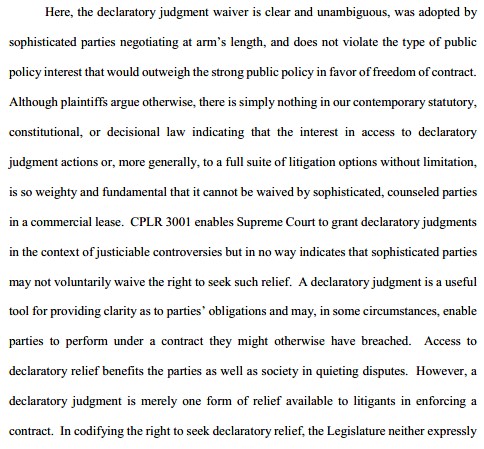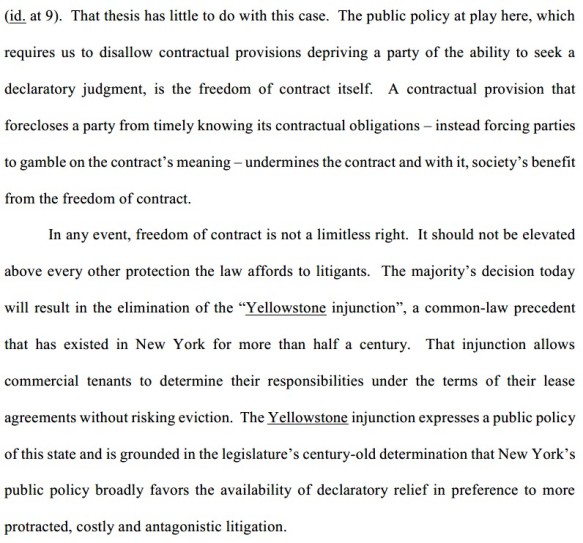Contracts are often ambiguous. They are usually long, with many terms, and you never know how they will apply in circumstances that the parties never contemplated. That’s why the power to go to court to ask for an interpretation of the agreement and how it applies to the unique facts that the parties face has been so important in New York, the self-proclaimed commercial center of the world.
Not anymore, says the majority of the Court of Appeals in 159 MP Corp. v Redridge Bedford, LLC (No. 26). The right to freedom of contract trumps all. And sophisticated parties with counsel are allowed to agree to waive the right to seek a declaratory judgment to interpret the terms of a commercial contract if they do so in the agreement. Public policy can’t invalidate the express terms of the waiver, and a suit seeking to interpret the agreement and a stay of the period in which to cure any default while the court decides the issues—better known as a Yellowstone injunction—must be dismissed.
In 159 MP Corp., commercial tenants executed two 20-year commercial leases to occupy a building in Brooklyn and run a grocery store. The leases were typical boilerplate commercial agreements, but had been revised by handwritten additions and deletions, including this paragraph in the lease rider:

After the building owner sent notices of default to the tenants, the tenants commenced a declaratory judgment action seeking a declaration that they hadn’t defaulted under the leases and a Yellowstone injunction to prohibit the owner from terminating the leases or bringing removal proceedings while the court decided the issues. The owner, however, moved to enforce the waiver clause, arguing that the action should be dismissed.
Supreme Court, Kings County denied the Yellowstone injunction and dismissed the complaint, holding that the clear terms of the waiver clause prohibited the declaratory judgment action. The Court held that the waiver didn’t prevent an action for damages or prohibit the tenants from raising any interpretation arguments in defense of a removal proceeding, but just precluded this action for declaratory relief.
The Appellate Division, Second Department affirmed, with one Justice dissenting, on this issue of first impression in New York. Like Supreme Court, the Appellate Division agreed that the waiver should be enforced according to its terms, and noted that the tenants were not left without available relief. The lone dissenting Justice, however, argued that the waiver clause is void as against public policy because “the declaratory judgment action, together with the Yellowstone injunction, serve a valuable public policy role in relations between commercial landlords and tenants, providing a mechanism for a commercial tenant to protect its valuable property interest in the lease while challenging the landlord’s assessment of its rights” (159 MP Corp. v Redbridge Bedford, LLC, 160 AD3d 176, 204 [1st Dept 2018] [Connolly, J., dissenting]).
On appeal, the Court of Appeals majority too held that the waiver clause should be enforced according to its plain terms. In doing so, the majority rejected the tenants’ argument that the waiver clause violates New York public policy. The public policy, the majority emphasized, actually cuts the other way in favor of the freedom of contract: “In keeping with New York’s status as the preeminent commercial center in the United States, if not the world, our courts have long deemed the enforcement of commercial contracts according to the terms adopted by the parties to be a pillar of the common law” (Opn, at 6). Thus, the majority held, “because freedom of contract is itself a strong public policy interest in New York, we may void an agreement only after ‘balancing’ the public interests favoring invalidation of a term chosen by the parties against those served by enforcement of the clause and concluding that the interests favoring invalidation are stronger” (id. at 8). According to the majority, that balancing in most cases, including this one, weighs in favor of the freedom of contract.


The availability of a Yellowstone injunction, the majority noted, is premised on having a valid action. Without one, the request for a stay is academic. But, the majority emphasized, a Yellowstone injunction isn’t necessary because a commercial tenant can’t be evicted from a property without first being able to defend its rights in a removal proceeding, where it will have the chance to argue about how the agreement should be interpreted and that it didn’t breach the lease. Thus, the majority reasoned, “there is no strong societal interest in the ability of commercial entities to seek such a remedy that would justify voiding an unambiguous declaratory judgment waiver negotiated at arm’s length, merely because this incidentally precluded access to Yellowstone relief” (Opn, at 16).
Judge Rowan Wilson, in dissent, would have voided the waiver clause on public policy grounds. As Judge Wilson put it,

Judge Wilson forecasts that the majority’s prioritization of the freedom of contract over access to the courts for interpretation of commercial agreements will incentivize building owners to “include a waiver of declaratory and Yellowstone relief in their leases as a matter of course. Those clauses will enable them to terminate the leases based on a tenant’s technical or dubious violation whenever rent values in the neighborhood have increased sufficiently to entice landlords to shirk their contractual obligations” (Dissenting Opn, at 2-3). Those dire consequences of the majority’s departure from the longstanding New York rule, he argues, are not worth the cost.
The Court of Appeals’ opinion can be found here.
